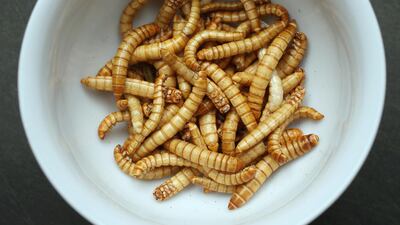Insects have crawled one step closer to a spot on dinner plates around Europe after mealworms were labelled fit for human consumption.
It is the first time the European Food Safety Authority has approved an insect for human consumption and is a big jump towards them finding a place on menus.
Dried yellow mealworm, the larval form of the mealworm beetle, is safe for human consumption in both its whole form and as a powder additive, the EFSA said on Wednesday, ruling on an application by French insect farmer Micronutris.
The statement from the EFSA, the European Union's food safety watchdog, is a first step before officials can consider whether to approve the sale of snacks, protein bars, cookies and other foods containing the bugs.
For insect farmers, the news was a shot in the arm for their industry, which analysts forecast will grow tenfold and exceed $4.1 billion globally by 2025.
"It's a clear and important milestone for the whole sector," said Antoine Hubert, co-founder of France's Ynsect SAS, which rears mealworms. "There will be a snowball effect. It will increase the potential to invest in further capacity and attract further funding to support the growth."
Insects are promoted as protein rich with a low environmental impact.
The ruling could "pave the way for the first EU-wide approval," said Ermolaos Ververis, an EFSA scientific officer.
"Risk evaluation is a decisive and necessary step in the regulation of novel foods by supporting policy makers in the EU in making science-based decisions and ensuring the safety of consumers."
"Its main components are protein, fat and fibre," the statement added, but warned that more research needed to be done on possible allergic reactions to the insects.
Insects are widely eaten elsewhere in the world, with an estimated 1,000 species finding their way on to dinner plates in Africa, Asia and Latin America.
But in Europe there could still be psychological hurdles for people to jump.
"There are cognitive reasons derived from our social and cultural experiences - the so-called 'yuck factor' - that make the thought of eating insects repellent to many Europeans. With time and exposure, such attitudes can change," said Giovanni Sogari, a social and consumer researcher at the University of Parma in Italy.


